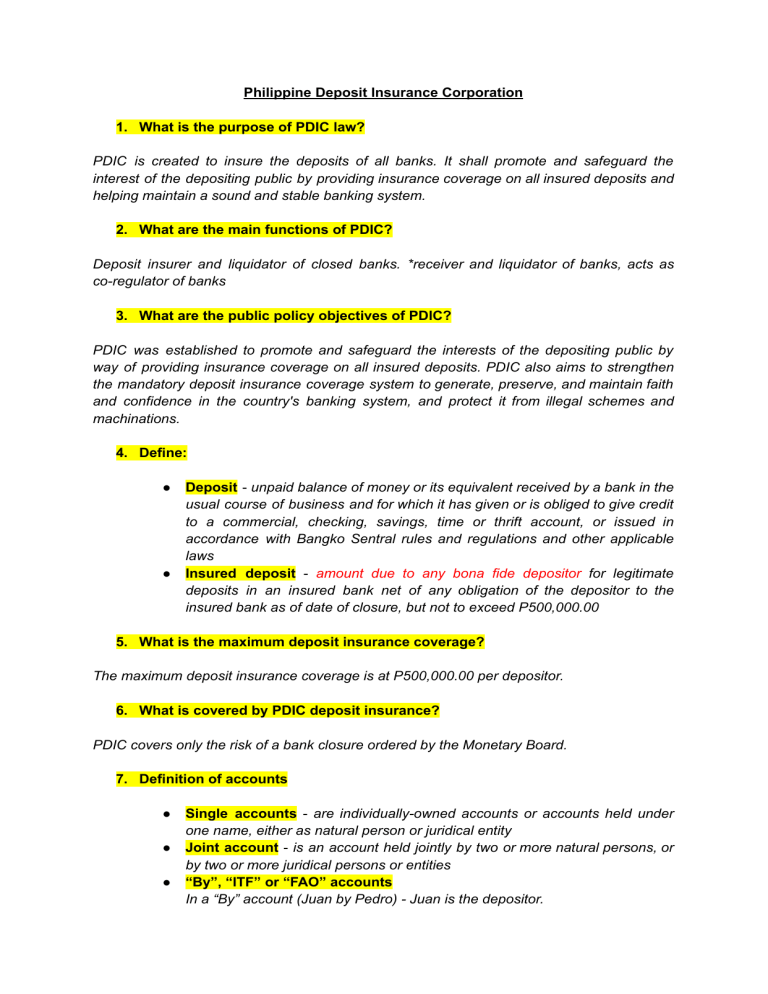
Philippine Deposit Insurance Corporation 1. What is the purpose of PDIC law? PDIC is created to insure the deposits of all banks. It shall promote and safeguard the interest of the depositing public by providing insurance coverage on all insured deposits and helping maintain a sound and stable banking system. 2. What are the main functions of PDIC? Deposit insurer and liquidator of closed banks. *receiver and liquidator of banks, acts as co-regulator of banks 3. What are the public policy objectives of PDIC? PDIC was established to promote and safeguard the interests of the depositing public by way of providing insurance coverage on all insured deposits. PDIC also aims to strengthen the mandatory deposit insurance coverage system to generate, preserve, and maintain faith and confidence in the country's banking system, and protect it from illegal schemes and machinations. 4. Define: ● ● Deposit - unpaid balance of money or its equivalent received by a bank in the usual course of business and for which it has given or is obliged to give credit to a commercial, checking, savings, time or thrift account, or issued in accordance with Bangko Sentral rules and regulations and other applicable laws Insured deposit - amount due to any bona fide depositor for legitimate deposits in an insured bank net of any obligation of the depositor to the insured bank as of date of closure, but not to exceed P500,000.00 5. What is the maximum deposit insurance coverage? The maximum deposit insurance coverage is at P500,000.00 per depositor. 6. What is covered by PDIC deposit insurance? PDIC covers only the risk of a bank closure ordered by the Monetary Board. 7. Definition of accounts ● ● ● Single accounts - are individually-owned accounts or accounts held under one name, either as natural person or juridical entity Joint account - is an account held jointly by two or more natural persons, or by two or more juridical persons or entities “By”, “ITF” or “FAO” accounts In a “By” account (Juan by Pedro) - Juan is the depositor. In an “In Trust For” account (Juan ITF Pedro) - Pedro is the depositor. In a “For the Account of” account (Juan FAO Pedro) - Pedro is the depositor. 8. What are the rules in determining accounts covered? Single Accounts ● In determining the insured deposit of single accounts, all deposits in the bank maintained in the same right and capacity for his benefit either in his own name or in the name of others shall be added together. Total insured deposit should not exceed the Maximum Deposit Insurance Coverage of Php500,000. Joint Accounts ● ● ● ● A joint account regardless of whether the conjunction “and”, “or” or “and/or” is used shall be insured separately from single accounts. Unless a different sharing is stipulated in the deposit documents, the insured amount up to the Maximum Deposit Insurance Coverage of Php500,000 shall be divided equally between or among co-owners of a joint account. If the account is held by a juridical person/entity jointly with one or more natural persons, the maximum insured deposit shall be presumed to belong entirely to such juridical person/entity. The total share of a co-owner in several joint accounts may exceed Php500,000 but will only be insured up to the Maximum Deposit Insurance Coverage of Php500,000. ”By”, “ITF”, “FAO” Accounts ● ● ● In the case where a depositor is the sole beneficial owner of a single, “For the Account of”, “By”, and “In Trust For” accounts, the consolidated balances of these accounts shall be insured up to Php500,000. The depositor’s total shares in his/her joint accounts shall be separately insured up to Php500,000. A depositor with single accounts and joint accounts may have insured deposits of up to Php1,000,000. 9. What is compensation or set-off in relation to computing insured deposits? The claim on the insured deposit shall be calculated net of any obligation of the depositor to the bank but shall not exceed P500,000. 10. Requirements for Claims ● Who are required to file claims? Depositors with: ● valid deposit accounts with balances of more than P100,000.00; ● outstanding obligations with the closed bank either as borrower, co-maker, or as spouse of borrower; ● incomplete mailing address found in the bank records, or failed to update them through the MAUF issued by the PDIC; ● accounts maintained under the name of business entities; ● accounts not eligible for early payment, regardless of type of account and account balance per advice of PDIC; and ● who are deceased whose filing of claim is through the legal heirs. ● ● ● ● ● ● ORIGINAL EVIDENCE OF DEPOSITS such as savings passbook, certificate of time deposit, bank statement, used or unused checks, or ATM card; ONE (1) VALID ORIGINAL PHOTO-BEARING IDENTIFICATION DOCUMENT (ID) with clear signature of depositor/claimant For depositors below eighteen (18) years old, photocopy of birth certificate from the Philippine Statistics Authority (PSA) or a duly certified copy issued by the local civil registrar, and valid ID of the parent. Original copy of a notarized Special Power of Attorney (SPA) for claimants who are not the signatories in the bank records. In the case of a minor depositor, the SPA must be executed by the parent. Claim Form ● ● ● ● ● ● ● What are the documents required in support of the claim? Who should sign the Claim Form? DEPOSITOR of the account - for depositor 18 years old and above PARENT - of depositor below 18 years old AGENT - in the case of “by” account TRUSTEE - in the case of “In Trust for (ITF)” account EACH DEPOSITOR/ACCOUNT HOLDER for account maintained as “Or”, “And/Or” or “And” - in the case of joint accounts AUTHORIZED REPRESENTATIVE/s - for business entities, deceased depositors and person who has Special Power of Attorney (SPA) from the depositor. 11. What is not covered by PDIC deposit insurance? The following, whether denominated, documented, recorded or booked as deposit by the bank, are excluded from PDIC deposit insurance: ● ● ● ● Investment products such as bonds and securities, trust accounts and other similar instruments; Deposit accounts or transactions that: are unfunded, fictitious or fraudulent, constitute; Deposit products constituting or emanating from unsafe and unsound banking practices; and Deposits that are determined to be proceeds of an unlawful activity as defined under the Anti-Money Laundering Law. Note: Bank losses due to theft, fire, closure by reason of strike or existence of public disorder, revolution or civil war, are not covered by PDIC.

